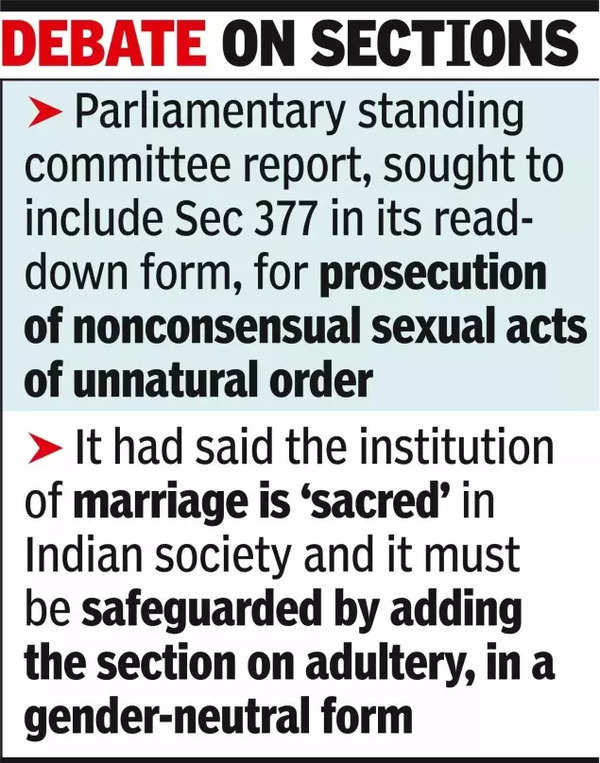NEW DELHI: Disregarding the recommendations of a parliamentary panel, the government has stuck to its decision to excludeSection 377 of IPC, which related to
unnatural sex
against the order of nature, and Section 497, related to
adultery
, from the Bharatiya Nyaya (Second) Sanhita Bill, 2023, introduced in
Lok Sabha
on Tuesday. The two sections have been read down by the Supreme Court.
The SC decriminalised adultery in 2018while it continues to be a ground for divorce.
The same year, it decriminalised consensual sex between
same-sex couples
. If the BNS Bill 2023 is passed by Parliament in its current form then both sections of IPC – 377 and 497 already read down by the Supreme Court will cease to exist.
The BNS Bill, however, added a new Section 73 to the provisions dealing with offences against women and children, making revealing of identity or information related to victims of rape and sexual offences from court proceedings punishable with imprisonment of up to two years.
“Whoever prints or publishes any matter in relation to any proceeding before a court with respect to an offence referred to in Section 72 without the previous permission of such court shall be punished with imprisonment for a term which may extend to two years and shall also be liable to fine,” Section 73 reads.
However, it is explained that printing or publication of the judgment of the Supreme Court or any high court will not be construed as an offence within the meaning of this section. Section 72 prohibits printing or publishing material revealing the identity of a victim of sexual offence.

The government has, meanwhile, accepted the standing committee’s recommendation on doing away with the alternative punishment for murder by mob lynching — proposed as not less than seven years in Clause 101(2) of the original BNS Bill — and made it at par with punishment for murder.
As per the revised provision, now numbered as Section 103(2), when a group of five or more persons acting in concert commits murder on the ground of race, caste or community, sex, place of birth, language, personal belief or any other similar ground, each member of such group shall be punished with death or with imprisonment for life, and shall also be liable to fine.
The parliamentary standing committee on home affairs led by Brij Lal, in its report tabled in Parliament on December 4, sought the inclusion of Section 377 in its read down avatar wherein nonconsensual sexual acts of unnatural order against men, women and transgender persons are still prosecuted under this section.
In its recommendations, the committee said even after the SC read down the section, “provisions of Section 377 remain applicable in cases of non-consensual carnal intercourse with adults, all acts of carnal intercourse with minors, and acts of bestiality. However, in the Bharatiya Nyaya Sanhita, 2023, no provision for non-consensual sexual offence against male, female, transgender and for bestiality has been made”.
It suggested that “to align with the objectives stated in the BNS, which highlights the move towards gender-neutral offences, it is mandatory to reintroduce and retain Section 377 of IPC”.
On the issue of adultery, in its recommendations the Committee noted that the Supreme Court in 2018 struck down section 497 of IPC as it violated provisions of the Constitution and held that this law was archaic, arbitrary and paternalistic and infringed upon a woman’s autonomy, dignity and privacy. The Court also held that the provisions under this section only penalised the married man, and reduced the married woman to be a property of her husband.
However, the Committee asserted that “the institution of marriage is considered sacred in Indian society and there is a need to safeguard its sanctity. For the sake of protecting the institution of marriage, this section should be retained in the Sanhita by making it gender neutral.”
